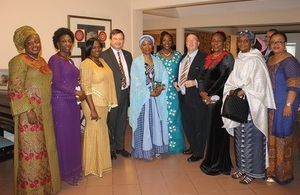British High Commissioner hosts dinner to discuss Nigeria gender gap
On the occasion of this year’s International Women’s Day, British High Commissioner to Nigeria, Paul Arkwright in partnership with the 100 Women Lobby Group hosted a working dinner that brought together women ministers, representatives of women advocacy groups and officials of the UK in Nigeria

British High Commissioner hosts dinner to discuss Nigeria gender gap
The event presented a platform for attendees to explore concrete steps to bridge the gender gap and promote women’s empowerment in Nigeria.
In attendance were notable figures engaged in advocacy for the empowerment of women and girls in line with the UN Sustainable Development Goals. They included the Minister of Women Affairs, Senator Aisha Alhassan, Minister of State for Budget and Planning, Hajia Zainab Ahmed, and the Chairperson of the Senate Committee on Sustainable Development Goals (UNSDGs) Senator Biodun Olujimi.
In his opening remarks British High Commissioner Paul Arkwright said he was delighted to offer a platform for the 100 Women Lobby Group. He commented on women’s representation in Nigeria’s governance space, particularly Parliament, and hoped to see more women in positions of responsibility in the country. He went on to say: -
“We need to work on boosting the capacity and confidence of women to put themselves forward as representatives to help lift the standing of women and girls in Nigerian society. We need to reach a point when it’s not unusual for women to be Governors, Senators, or Members of the House of Representatives.”
The Minister for Women Affairs, Senator Aisha Alhassan stated that political differences do not get in the way when it comes to gender matters. She stressed that irrespective of party affiliation, Nigerian women are united around the gender parity issue. In her words: “There is no party politics in gender – we are all women”. Several other participants echoed this sentiment.
For her part Coordinator of the 100 Women Lobby Group Felicia Iyore Onibon spoke of her organisation’s current work,
“One of the main things we’ve projected is that we should begin to look at gender accountability and that the only way we can do this effectively is to get those that are leading us to actually lead this process.”
Discussions also explored how to build alliances between ministries to strengthen leadership for development of gender responsive policies with discussants hoping to establish a leading women caucus to advocate for gender equality, accountability & sustainable governance.
The event served as a platform for the 100 Women Lobby Group to advance the agenda. Various participants expressed their willingness for further engagement and discussions.
The 100 Women Lobby Group is a civil society group involved in promoting women participation in politics. It works closely with the Federal Ministry of Women Affairs and Social Development and has representation in every State in Nigeria. Its mission is to hold strategic dialogue with political, policy and development actors to support and demand for accountability to Nigerian women.